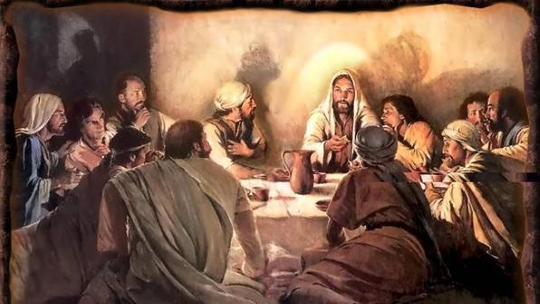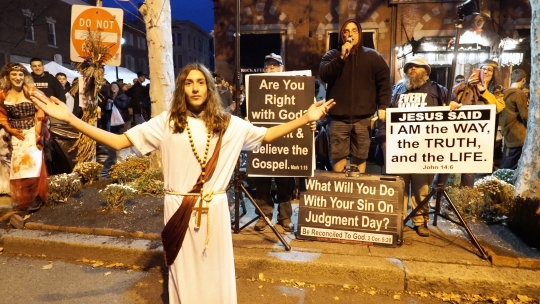Sunday Studies: Recline at Table

And Levi made him a great feast in his house, and there was a large company of tax collectors and others reclining at table with them. And the Pharisees and their scribes grumbled at his disciples, saying, “Why do you eat and drink with tax collectors and sinners?†And Jesus answered them, “Those who are well have no need of a physician, but those who are sick. I have not come to call the righteous but sinners to repentance.â€
A similar encounter occurs again in Luke 15, a chapter I had read this past week. While it would have been more appropriate for me to have quoted that passage, I feel this one illustrates a similar point more succinctly. Christ is dining not with the priests and scribes, but those looked down upon as sinners.
Both confrontations have taken up residence in my mind, occasionally popping out of their bedrooms and imposing upon me their presence. What seems a simple, straight-forward message is soon over-complicated by my own contemplations, and before I know it I’m submerged so deep I can no longer see the light glistening upon the surface.
This has become commonplace as the Bible continues to spark my mind. Ideas that seem fascinating enough to openly ponder suddenly become overwhelming as I scribe letter to document. The natural rebound from my overzealous desire to act, I suppose. Further confirmation that creating a column for such things was none other than a jumping gun.
Let’s trace back to that first book study at my Church. The text of choice was Evangelism: How the Whole Church Speaks of Jesus. The very title stood my hairs on end. Evangelism? Like TV Evangelists? Oh, what have I gotten myself into?
Based on the book’s opening chapter it became clear that the eccentric, charismatic nature of televised witness was not the definition the book was chasing for. Dictionary.com defines it as “the preaching or promulgation of the gospel”. Merriam-Webster opaquely describes it as “the winning or revival of personal committments to Christ”. While tertiary and secondary definitions attach a zealous nature to the word, neither identifies it primarily as such. At its most basic, evangelism is simply speaking outwardly about the Christian gospel.
When Jesus reclined at table with sinners and tax collectors, he was evangelizing. When he spoke at the temple, he was evangelizing. When he spoke to the crowds between towns, he was evangelizing. Perhaps not literally, as “the gospel” refers to Christ’s teachings and not the laws of the Old Testament. If evangelism is preaching the gospel and the gospel does not take form until after Christ’s resurrection, then technically Jesus was not evangelizing. His teaching would become the model that his disciples and apostles would later follow, however. As such, we can look to his own actions as a representation of how we should go about evangelizing.
So why do I struggle with these passages as I do? Upon first reading you’d think I’d have this aspect of Evangelism down perfect. My closest friends have often been non-Christians ever since I entered College. Most of my social encounters are spent dining with “sinners”. I got this, right?
Not at all, because under most circumstances I’ve kept quiet about my faith or been guarded in how I phrased things. Some of it is due to the negative reputation of the Church. I wish to remove myself from those other Christians. I’m often left fearing I’d seem like a fool, forced to admit I lack all the answers. How can I believe in something if I don’t know everything about it? Finally, much of my philosophy can be considered offensive. It can fly in the face of conventional wisdom.
I’ve struggled with these passages because, from my perspective, the context no longer exists where one can “dine with sinners” and converse so honestly. Beginning today and continuing for the next three weeks, I’ll be mulling over these points to better understand where this perspective comes from and whether or not it is true.

The first point to examine is also the greatest perceived struggle: the negative reputation of the Church. The actions of the institution and other believers of the faith will feed into all of my other anxieties. Why not just divorce myself from other Christians, then? While the desire is strong, I think it also weakens the faith universally.
But some of them said, “He casts out demons by Beelzebul, the prince of demons,†while others, to test him, kept seeking from him a sign from heaven. But he, knowing their thoughts, said to them, “Every kingdom divided against itself is laid waste, and a divided household falls.
Christ’s counter-argument may not be in reference to the Church – on the contrary, it’s in discussion Satan’s forces – but the logic is universally sound. A house divided against itself is doomed to fall. If half of my time with non-Christians is spent attacking other Christians, then it further weakens the credibility of the belief as a whole. Yes, there are a lot of very loud people with ignorance of the scripture. The same can be said of any belief structure, however. Be it matters of faith, matters of political ideology, or academic specialties, the vast majority will have superficial understanding or vast gaps in knowledge. There will always be people of little knowledge shouting very loudly.
Even so, many of those loud voices have encouraged a divide between Christians and sinners. Rather than learn from Christ’s example, we’ve returned right back to a leadership resembling the Pharisees of Jerusalem. They’ve created new, extrabiblical custom and called it tradition. To be a believer is to also be an American Patriot. Most of all, Christians should create an impenetrable divide between the Church and the sinful, secular world.
Churches hold their own alternatives to Halloween. Home schoolers are intentionally removed from the “influence” of those heathens in public school. Children’s television isn’t enough to educate and communicate the basics of morality. Instead, they must be encouraged to follow such awful, awful home videos as Psalty the Singing Songbook.
Some of these divisions are understandable. Take Halloween as an example. Regardless of whether I enjoy it, I can understand a believer seeing the holiday as an excuse to celebrate violence, gore, or reckless indulgence. After all, even if we divorce the holiday from its pagan origins, we have a holiday that often encourages over-consumption of candy in children and over-sexualization in adults.
The motives of Churches are not only rarely so thought out, but are outright militant and condemning of the holiday. are discouraging and harmful. “Halloween is bad”. Why? “Because it celebrates demons!” No, it doesn’t. At most it celebrates horror films, which is a separate can of worms. The holiday has transformed, but the argument against it remains shallow and outdated. This same simplified perspective persists year after year of Sunday school, where the moral of the stories are that lying is bad, stealing is bad, and bad things will happen if you’re a bad person. Isn’t Jesus wonderful?
I was a child that spent a few Halloween holidays at Church rather than on the street in costume. Candy was still dispersed. Games were still played. There were still indulgences, just no costume. It didn’t feel like an alternate, fun activity away from the “dangers” of a Satanic holiday. It felt like a clueless, limp distraction from the more exciting activity everyone else was enjoying.
In Sunday School I found myself a victim of the same bullying that I experienced at public school. So much for those moral lessons every Sunday! In response I became more insular and absorbed in secular creations of books, video games, and television. I was drawn to non-Christians because they at least understood me.
Which is the problem with such great divisions. I didn’t have adults capable of explaining to me why I found the violence in Jurassic Park or The Lost World exciting. They just told me that was bad and I should read something more wholesome. No one was capable of helping me realize how the clashing personalities in Michael Crichton’s Sphere are what engrossed me in that novel. The only acknowledgement I received from adults was relief that I was reading at all.
So what does this all have to do with Jesus dining with sinners? When the Institution of Christianity vehemently pushes rules without philosophy, meaning, or understanding, the inevitable push back is going to be equally strong or stronger. In a world where College education is more prevalent, people believing themselves capable of deep thought are able to spot the Institution’s fallacies with little challenge. No longer is it simply a matter of discussing personal philosophies.
It’s a competition to prove who is more or less ignorant.
Yes, I was friends with many non-Christians in College. Many of them made jest of my faith, loudly proclaiming within my presence that any who believed in religion were idiots. I found myself in the habit of being on the defensive, just as those who were once surrounded by zealous ignorance must have felt in their own youth. The divide of beliefs has put everyone’s hairs on end, and it has contributed to killing conversation.
I will try to begin addressing the difficulties that arise from such an atmosphere next week. Thank you for reading my incomplete thoughts as I record the journey of my beliefs.


